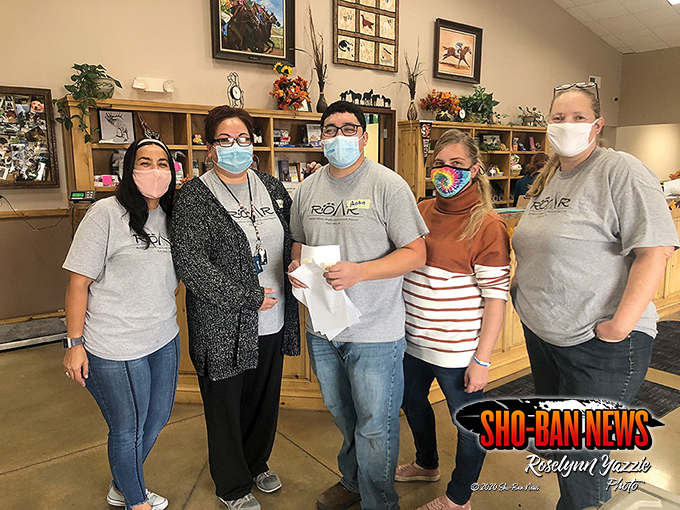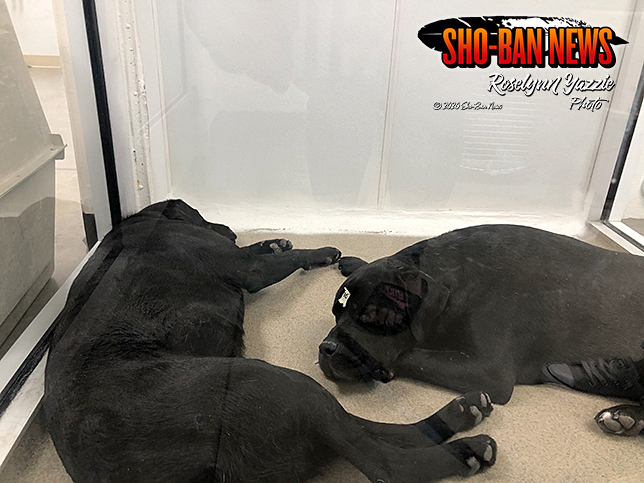Fort Hall ROAR spays & neuters 200 animals in 2020

Fort Hall ROAR group members at the November 7 spay and neuter clinic at Alpine Animal Hospital.
By ROSELYNN YAZZIE
Sho-Ban News
POCATELLO — Fort Hall ROAR, a non-profit organization, has successfully spayed and neutered about 200 animals this year from the reservation after the completion of their third clinic on Saturday, November 7.
Tressa Gonzales, president of ROAR, said they had 71 animals scheduled to be fixed that day, which happened at Alpine Animal Hospital, a previous spay and neuter clinic took place at Mountain View Veterinary Hospital. She wanted to recognize Dr. Steve Haymore, Dr. Danielle Newman, Dr. Seth Lundquist, Dr. Michael Long and Dr. Shelly Knight for helping with the spay and neuter clinics. They would also like to acknowledge the staff at these facilities and volunteers for making the clinics possible. Appreciation also goes to the BYU students who lent a hand for the event.
The event was funded by the American Society for the Prevention of Cruelty to Animals (ASPCA). Participants were brought in by Fort Hall ROAR and the coalition they’re a part of.
ROAR connected in 2016, with a few tribal members and residence connecting through rescue. Darla Cates, who is no longer a member of the group, was a key component in getting them connected to the All About the Animals Coalition, which includes six of southeast Idaho’s rescuers. The group eventually became a non-profit group in 2017.
ROAR does much of their outreach through their Facebook pages, which includes Fort Hall ROAR and Fort Hall ROAR: Missing Lost & Found. Gonzales invite the community to follow us on our non-profit pages.
ROAR’s other members are Nancy Miller-Wahtomy and Corey Caldwell, Angie Willham, Janae Crispin, Austin Perez, Anthony and Jessica First family. They are currently not inviting any new members in because they’re trying to build their platform. However, they are looking for volunteers to consider fostering, supply donation of dog houses, straw and dog food.
“Those are a lot of ways that people can help and connect with us,” she said.
Gonzales said the Animal Control Ordinance needs to be updated and enforced.
She explained ROAR provides a community service and sometimes they're not always available. She said sometimes people confuse them with animal control and that is not what they are. They do work with Fish & Game, who sometimes turn over animals to them.
“We cannot always run to every call, but we do the best we can to network and connect with all of the right resources to provide education and information for anyone,” said Gonzales.

Dogs in recovery after neuter surgery.
Some misconceptions about ROAR is they rescue every situation and they don’t. She said they go when they’re called out to a home and respond to the community at their request.
Another misconception is they trap ferals and rehabilitate them, which they don’t. She said they can’t risk any of their rescuers to capture them. Gonzales identified feral cat colonies as a huge problem on the reservation.
Another misconception is they are a funded by the Fort Hall Business Council, which is untrue, because they are their own entity. However, last year they did receive $1,500 for support from tribal council member Ladd Edmo’s personal line item only.
They also got $250 from the Fort Hall Casino last year.
This past summer they received a large donation from the Idaho Humane Society, which went to the community members during the pandemic.
She explained people need to take in consideration the cost of a spay and neuter, which is $120 to $130 per dog and $80 to $90 per cat. She said they work to get funding for these because controlling the population is the biggest goal.
She said their goal is to help people manage the pets in their homes and bring them up to code with the ordinance – which is three animals per household. She explained if they have animals they want and also animals unwanted, but they’re caring for, ROAR can come in and help the situation by removing the unwanted animals and placing them – but they have to be tame.
Gonzales said she worked as a Census taker on the reservation and was able to see first-hand the homes in need of the help.
Education for the community is another goal, in the means of teaching them how to get their animals proper nutrition, how to rescue, and giving spaying and neutering information.
She said they’re still learning about their non-profit status and working to educate themselves to learn the process. She said they also receive grants from outside sources from places like Snake River Animal Shelter, All About the Animals Coalition, and Idaho Humane Society.
They’re future goals include working to see the Tribes get an animal control officer, an updated ordinance, a facility, and a mobile unit they can spay and neuter animals on the reservation all year round.
ROAR still has T-shirts for sale in adults size small to 5X, information can be found on the ROAR page for donation as well.
For more information message the ROAR Facebook page or contact Tressa at 208-406-8777.





